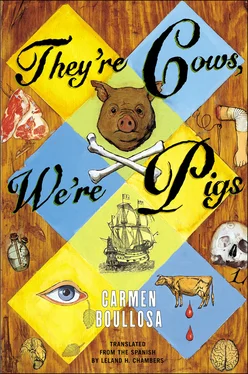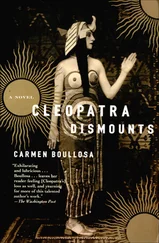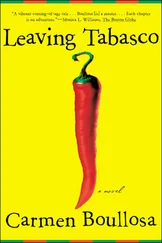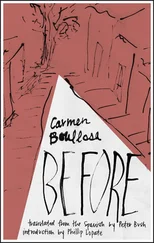
In the ship on which I came, there were some soldiers, as I have mentioned before. They too had been engaged by the French West Indies Company, but for the purpose of wresting outstanding payments or the return of merchandise from the colonists on Tortuga who had refused to respect agreements with those they were opposed to because they were not of the same religion. The Company had taken possession of the island in 1662, arrogating the colony for itself, with its own commissaries and its own servants, and ordering the residents of the island to buy all their supplies from the Company, first having ingratiated itself with the colonists by announcing that purchases would be made on credit. But it was one thing for the Company to impose itself, and quite another for it to operate that way.
The farmers were the first ones against whom the soldiers determined to move, they being the easiest victims. It was le Turque who was chosen; they flattened his house and carried off anything of value, they beat him when he tried to stop them, and, letting their horses run loose over his tobacco fields at a time when the plants were scarcely out of the ground, they reduced his plantings to mud and upthrown seedlings, thinking thus to intimidate the others and obtain what was owed them, the only reason for their being on Tortuga; after which they returned to the ship then anchored before Cayonne, following the orders of the governor established by the Company in the foolish belief that he was putting them safe from possible attacks by the colonists. The following morning, they found the night guard murdered, his mouth and ears and belly split open and filled with earth taken from the fields belonging to le Turque and a message written on the deck in the blood from his mutilated limbs, which had been used one after the other as paintbrushes, nearly worn to shreds from having been rubbed over the planks: YOU ARE CATTLE, LIKE CATTLE YOU WILL ALL EAT GRASS. The trail of blood from the body underlined the sentence and ran down to the ship’s railings and scuppers, as if the body were a fountain of blood. The Captain having called everyone on deck, they were abruptly boarded by ferocious Brethren of the Coast who had reached the ship in canoes carrying a good deal of fodder for the soldiers, who, surrendering, were then forced to eat the plantings trampled into le Turque’s fields, mingled with mud, shit, and weeds, an ingestion that killed more than one of them and and put the others into horrible pain for days altogether, after which they abandoned Tortuga, and because of which the commissaries put into effect the order that the Saint Jean had also brought them, which was that if they could not collect what was owed them or enforce the return of goods, they should sell whatever they had under their control, properties, merchandise, and indentured servants alike; a decision, which, as it included the almost absolute retreat of the Company, put jubilation into the hearts of the colonist farmers, who wasted no time in taking over the goods, quibbling over prices that were actually not assessed dearly by the commissaries, some out of a mixture of respect, fear, and admiration, the others simply out of hatred for the Brethren of the Coast, who were by all odds the winners in this business.
Joy was the feeling that went the rounds on Tortuga during those days, but not for me, because I was acquired, for my bad fortune and worse luck, by the most tyrannical and perfidious man ever roasted beneath Tortuga’s sun, the Governor or Lieutenant General of that spot, set up by the Company itself. The words “joy” and “freedom” were circulating on Tortuga because the Brethren of the Coast claimed they owed loyalty only to God and the sea, but there was no freedom for me because I did not have a penny or anyone I could ask to pay off the price my cruel master demanded to give me freedom and my immunity: three hundred pieces of eight. His treatment of me was unbearable and it was impossible to escape.
There were slaves who had already tried it, either from him or from other masters who were just as cruel. I saw them strung up, hanged, exposed to the sight of all until the worms and the birds had left no more of them than their bones. Then bits of them fell to the ground in a jumble. The punishment that others received for their attempt was to have a leg cut off, and such legless slaves came to be so numerous that a French colonist on Martinique invented a way to make his slaves secure by a kind of imitation of those who were already missing a leg, with a short chain fastened at one end to an iron collar and at the other to one ankle, encircled in iron like the neck. So that some slaves, even though in possession of both their legs, hobbled around as if they had only one, with added injuries caused by the infernal heat, aggravated by the sun, that condensed on the metal collar and the ring that went around their ankle.
One slave who escaped was caught in the forest. His master had him tied to a tree, where he beat him on the back with sticks and bathed him in so much blood that it was running on the ground. Then the master had his wounds dressed with bitter lime juice mixed with salt and ground pepper, leaving him tied to the tree in that state for twenty-four hours, and repeating the torture later, until from being beaten and so badly mistreated the slave died, not without first screaming out, in a sharp, piercing voice that seemed to reach beyond the forest and lose itself in the sea, “May the powerful God of the Heavens and earth permit the devil to torment you as much before your death as you have done me before mine!”
Three or four days later, the evil spirit fell on that landowner. His own hands were his executioners, as he beat himself and scratched his own face so severely that it lost its shape, and he died in a pool of his own blood, like his slave, intensifying his torment with the salt and pepper of a punishment he never expected; the usual thing being that the landowners did whatever their ill will desired, and they could offer their slaves, no matter what their race, any maltreatment whatsoever, even death, because they were not within anyone’s jurisdiction. Thus, for the slaves (Nau aside, for he was always out of the ordinary) the only possible escape, if they could not stick it out for the period of their indenture, being three years for the French and seven for the English, was death. The white slaves (black slaves and those who are a mixture of blacks and Indians, called matates , are not forced to work as hard as the Europeans, the landowners saying that the former should be taken care of since they belong to them forever, while the whites, on the other hand, who cares about them! they only have their services for three years), some sooner and others later, would fall into a certain sickness called mal d’estomac there, which is a total privation of all the senses and comes from their maltreatment and the change from the air of their natal land into something completely the opposite. If, as everyone knows, people die of sadness, of disillusionment, of the state of mind caused by deception in love, why should the French slaves not die under such cruel treatment in lands so different from those they are used to? They did not hear, they did not see, they did not feel the intense heat, nothing pained them, they suffered neither hunger nor thirst: before dying they entered into the realm of the stones.
I was not the only slave of the governor, but I was the only white one, so that, for the reasons just stated, the worst part fell to me, the hardest labor. My condition was not so strong as to be able to resist it, being as yet unused to Tortuga, because of the state of my convalescent heart and because my body, tortured by hunger, was still growing — as my nature, perhaps touched by Tortuga, dictated: hastily and excessively (in a short time having made me a tall man, unusually thin, but a man and no longer a boy, to whom she would not dare confess her secret now as she had done to my small, child’s body). Several times I was on the verge of breaking down under the beatings and the harshness of my master, and doubtless I would have done so had it not been for two consolations: my new living quarters, less strange, barren, and severe, a stone building that formed part of the island’s fort; and second, though of much greater importance, my relationship with the man who occupied the room next to mine, le Nègre Miel, who, though half blind, took me in without caring that I was a white Frenchman, finding me merely a young man tormented by a cruel master. Such compassion did I awaken in le Nègre Miel as he showed affection and generosity, bequeathing me his wisdom on the one hand and eternity on the other, through my account of his reminiscences and thoughts, which I will offer very shortly. My ability to substitute lies for work also provided no small aid for my survival, although for every ten lies I came up with, my master would catch me out in one, and then he really made me pay for it with his whip.
Читать дальше













